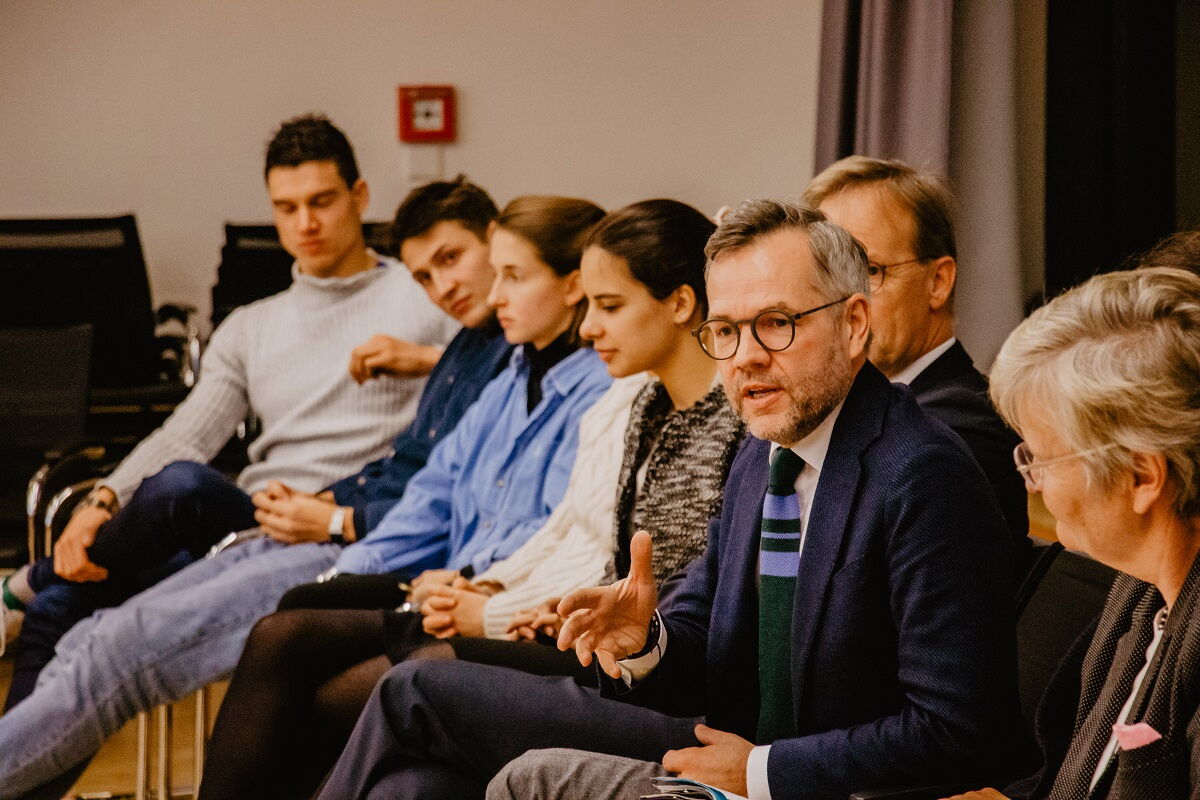“Cross-border projects require a certain finesse”

Michael Roth, Minister of State for Europe, met with Eucor students at the University of Freiburg on December 2, 2019 to discuss the challenges of cross-border cooperation and European relations. Around 40 Eucor students from Germany, France and Switzerland from different disciplines came to the Rectorate in Freiburg to talk with Michael Roth.
As they arrived on the 6th floor of the Rectorate Building in Freiburg, the students first gazed out the window, observing the winter sunshine, the French Vosges Mountains stretching out to the west of Freiburg and toward the horizon. To the east, they saw the Freiburg Schlossberg and the Black Forest rising. It was a perfect setting to discuss cross-border relations with Michael Roth, Minister of State for Europe and Federal Government Commissioner for Franco-German Cooperation.
Many students travelled from their study locations in the border region for the talk. Mobility and transport play an important role for all Eucor students, as they often have to commute between their different study locations in the border triangle. However, commuting is often a cumbersome and expensive matter. To date, there is still no cross-border rail ticket, and even the rare rail connections are quite an obstacle. As a result, the students discussed ways to improve local cross-border transport with the Minster of State.
Michael Roth pointed out that even at the national level many different actors are involved in the implementation of infrastructure projects. He explained that bi- or tri-national or even European decision-making is a complex and lengthy process, even with political will: Different financial ideas, legal bases and administrative systems must be taken into account. “Cross-border projects require a certain finesse and knowledge of other country systems,” said Roth.
According to the students, an improvement in cross-border local transport would not only benefit them themselves, but would also be an important sign of the convergence of the trinational Upper Rhine region.
However, the idea of cross-border cooperation is not popular everywhere. The nationalist and populist tendencies in Europe are an issue that both the Minister of State and the students find disturbing. Roth sees experiences of exchange and mobility as the best means against nationalism and populism. Expanding exchange programs to the vocational field is a priority for him so that a larger circle can have positive intercultural experiences, such as students within the framework of Eucor or Erasmus+.
The personal commitment of individuals such as professors, student groups or members of partnership or exchange associations and international youth organizations was also regarded by the students and Roth as indispensable for Franco-German and European cooperation. “However, the states must also create structures that are not tied to individuals, but are supported by institutions themselves,” explains Michael Roth. The Aachen Treaty, which Emmanuel Macron and Angela Merkel signed in January 2019 and which ties in with the Élysée Treaty of 1963, is such an institutional framework and a signal for strengthening Franco-German cooperation.
“People who contribute their beliefs, ideas and time to implement a treaty and have the courage to try something new are irreplaceable,” Roth concludes. “For this we need students like you who are already familiar with other cultures and languages and are committed to European values.”
Madeleine Marquardt